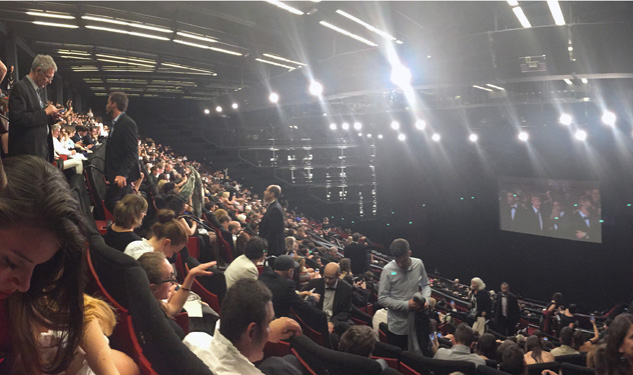
- Industry
Amy Moves Cannes
Amy was hotly anticipated as one of the “event” movies of Cannes 68 and the documentary on the meteoric rise and very public flame-out of British R&B chanteuse extraordinaire Amy Winehouse didn’t disappoint. The thorough, emotional bio is directed by British film-maker Asif Kapadia who brought Senna to Sundance in 2012. For that documentary Kapadia had unprecedented access to the vast archives of FIA, Formula Ione’s racing governing body and was able to reconstruct a fly-on-the wall portrait of the Brazilian champion pilot of amazing detail and insight. If anything Amy is even more incredibly MINUTIOUS.
Once again Kapadia secured full access to a veritable trove of documents, photos, audio (down to recorded phone messages) and above all video on Winehouse who, along with her childhood friends, was something of a compulsive self-recorder. The result is a film, which is exhaustively informative but above all as powerfully emotional as any dramatized version might hope to be, covering all the phases of the rise, meteoric success and inevitable epilogue in the life of one of the brightest musical stars of recent decades. The film opens as a 14-year old Winehouse celebrates a birthday together with classmates
in a North London flat. The girls take turns singing Happy Birthday and when its Amy’s turn she concludes her rendition with a vocal flourish worthy of a seasoned torch singer. It’s a moment that you couldn’t have scripted and sets in motion a narrative that gradually offers glimpses of an ordinary suburban childhood that takes a darker tone after the
parent’s divorce.
We learn of Amy’s early love for jazz and the classic stylings of Ella Fitzgerald, Tony Bennett and Dinah Washington and witness her first efforts at songwriting and performing. Also taking note was 19 year-old aspiring Promoter Simon Fuller. We watch as their efforts lead to an eventual record deal for her debut album, Frank.
As her fame and success grows (recorded by ubiquitous cameras – first her own and those of friends, later those if an increasingly frenzied media) Kapadia weaves her tale aided by interviews with all the principals in her life, her father, producers and collaborators like Mos Def and Salaam Remi, producers and bodyguards.
Soon one figure begins to loom large in the proceedings, that of lover and boyfriend Blake Fielder-Civil. Their relationship takes on a progressively more destructive dynamics and soon we are looking at the spiral of substance and emotional abuse that would prove fatal in the end. Again Kapadia fills in the back-story with interviews and flashback videos that help to, if not definitively explain, this most tragic of stories. At no time is there a sense of exploitation in Amy (and that can definitely not be said of some of those featured in the documentary, including a rabid scandal press and by extension on all of us with our collective nee for celebrity news).
Even as we know the inescapable ending we take comfort in moments such as when Winehouse finally gets to sing a duet with her childhood idol Tony Bennett. What this fine documentary ultimately leaves us with is the sense of just how rare of talent this young singer was and a deeper sadness for having lost her much too early.
Luca Celada

